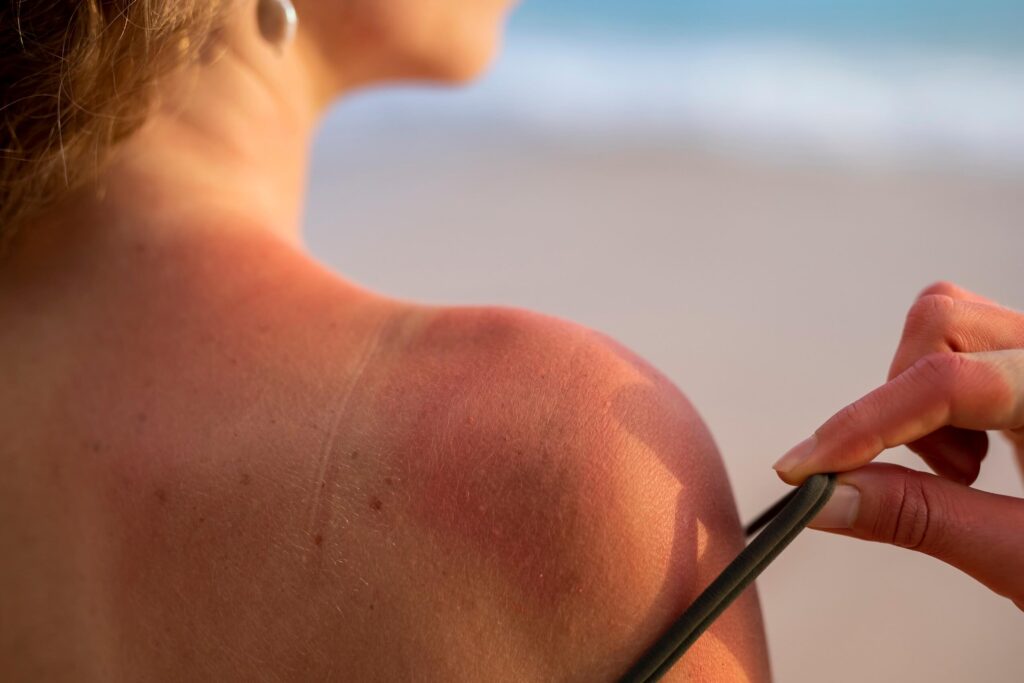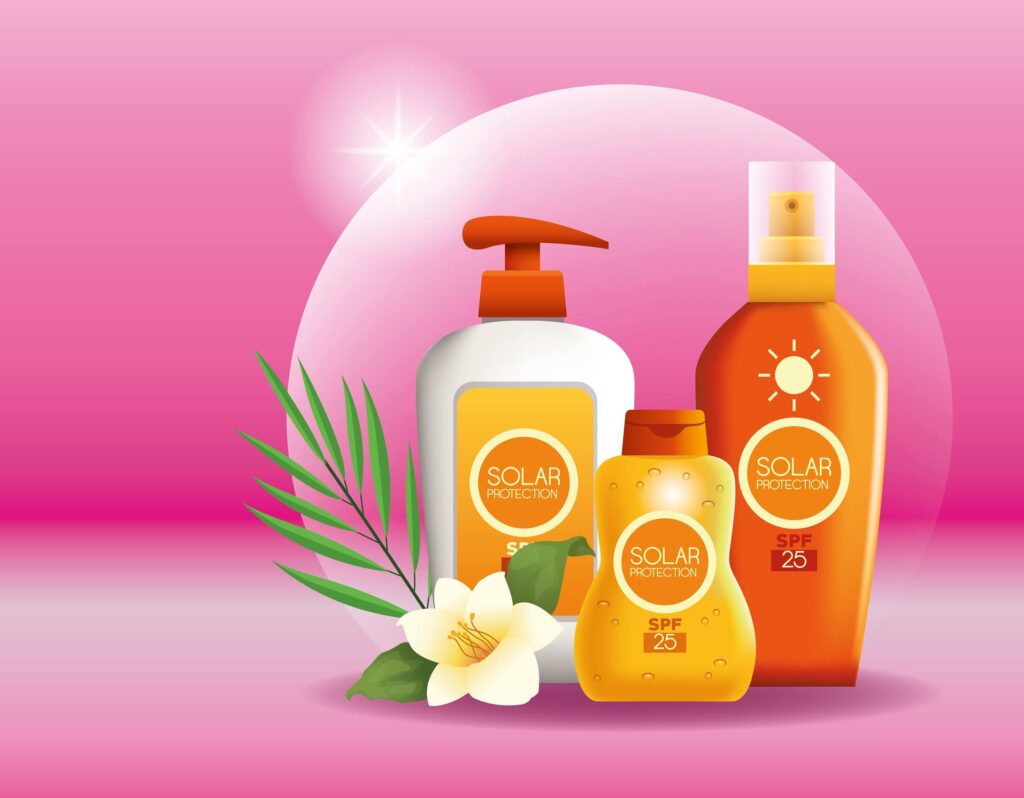Sun protection why you should apply sunscreen everyday? Sunscreen is an essential skin care product that can help protect against the sun’s UV rays, both indoors and outdoors. It is important to apply sunscreen everyday throughout the year, regardless of the season. This article provides an overview of the benefits of sunscreen, including its SPF rating, as well as how to use it for maximum benefits and how often it should be applied.
What is SPF?
The sun protection factor (SPF) is a measure of how effective sunscreen is against sunburn caused by ultraviolet B (UVB) rays. The SPF number indicates how long it will take for ultraviolet B rays to burn your skin. For instance, if you use a sunscreen with an SPF of 30, the UVB rays will burn your skin 30 times faster than if you did not use any sunscreen at all. An SPF 50 sunscreen blocks around 98%, and an SPF 100 sunscreen blocks around 99%. No sunscreen can block 100%. Broad-spectrum sunscreen

Sun protection why you should apply sunscreen every day?
Playing outside is a great way to get your vitamin D, but if you don’t take care of yourself in the sun, you can end up with some pretty nasty sun damage. UVA and UVB rays can cause damage to your skin’s DNA, which can lead to cancer. Plus, UV rays can cause other kinds of damage that can lead to skin changes. Even though you don’t spend a lot of time outdoors, you’re still exposed to UV rays all the time. To protect your skin, it’s important to use sunscreen regularly.
How does sunscreen protect you, and How to find the right sunscreen?
Different types of sunscreen contain ingredients that reduce the amount of UV radiation absorbed by the skin. The American Academy of Dermatology (AAD) recommends that you look for a sunscreen with a SPF of 30+, a broad spectrum (UVA/UVB) sunscreen, and a water resistant sunscreen.
There are two main types of sunscreen: Chemical and Physical.
Chemical sunscreens work like a sponge, absorbing UV radiation. They contain ingredients such as avobenza, oxybenza, octisalate, etc.
On the other hand, physical sunscreens work more like a shield, absorbing UV rays. They contain zinc oxide, titanium dioxide, etc. Mineral sunscreens are generally more protective of your skin. So it’s a good idea to look for one with mineral ingredients, especially if you have acne or sensitive skin, as they’re less likely to irritate or cause skin allergies.
Why You Should Wear Sunscreen every day?
Take a look at the top interesting reasons why you should wear sunscreen throughout the year:
1. Provides Moisture
Many sunscreens are formulated with moisturizing ingredients, which can help to keep the skin hydrated and prevent it from becoming dry. As dry skin is more prone to sun damage, moisturizing the skin can help to protect it from the sun’s rays.
2. Lowers Skin Cancer Risk
It’s super important to put on sunscreen every day to protect your skin from the sun’s UV rays. Not only does it look great, but it can also help protect your skin from different types of cancer, like melanoma and squamous cell carcinoma. And above, sunspots can be a warning sign that you might have skin cancer.
3. Protect From Harmful UV Rays
The ozone layer is getting thinner all the time, which means you are more vulnerable to the sun’s damaging rays. Sure, you need to get your Vitamin D every day, but that doesn’t mean you should put yourself at risk! UV rays can cause sunburns and skin damage, so it’s important to use sunscreen to protect yourself. It can block or absorb UV rays, which can cause DNA mutations that can lead to cancer.
4. Prevents Sunburns
Sunburns can make your skin thinner, more transparent, and bruise more visible. You may experience repeated episodes of peeling, swellings, redness, itching, and hives. This is caused by UVB rays, which cause sunburns. The intensity of UVB rays varies depending on the time of day, with the strongest at noon and in the spring and autumn, but can burn people all year round. Additionally, UVB rays can pass through clouds, so even on cloudy days, it is important to wear sunscreen. The Sun Protection Factor (SPF) is an indicator of the amount of protection a sunscreen provides when applied correctly.
5. Prevents Premature Aging
Putting on sunscreen every day can help protect your skin from the sun’s UV rays that can cause premature ageing. UV light can cause wrinkles, sun spots, and lax skin, since it breaks down the collagen and elastin proteins that keep your skin firm. Over time, these proteins can damage the skin, leading to premature aging and sagging. Sunscreen is a great way to prevent this, as it helps keep your skin looking healthy and youthful. Plus, it can help reduce the look of pimples, small blood vessels, freckles, and fine lines.
6. Prevents Tanning
Tanning is a good thing. But what you need to know is that during your tanning session, you are exposed to the harmful UVB radiation. To avoid tanning caused by UVB rays, choose a sunscreen with at least a sun protection factor (SPF) of 30. You should reapply SPF every 2 hours, especially for those with sensitive skin. You should also apply SPF just after your workout, as sweat can erode the SPF coating.
7. Improves Skin Texture
Sunlight can cause skin to become discolored and uneven, resulting in a dull and lifeless appearance. To combat this, sunscreen can be used to protect the skin from ultraviolet radiation and reduce the risk of damage to skin cells. Additionally, UV light exposure can lead to the formation of enlarged blood vessels in the face, which can result in red and purple blotches and persistent skin discoloration. By using sunscreen, it is possible to reduce the risk of these issues.
8. Reduces Hyperpigmentation
If you’re in the sun for too long, it can cause your skin to become darker than it should be. To help reduce this, sunscreen can be used to protect your skin from the sun’s UV rays. UV light can also cause skin problems like photodermoses, which can cause rashes, freckles, dryness, and unusual pigmentation. Plus, UV light can make other skin conditions worse, like lupus and rosaacea.
9. Prevents Sunspots
Sunspots are tiny, dark spots on your skin that are caused by sun damage. Sunscreen can help stop them by protecting your skin and stopping the sun from damaging your skin cells. When your skin is exposed to UV light, it makes it harder for your immune system to fight off illnesses and slows down your body’s natural healing process. So, if you use sunscreen regularly, it’ll help protect your skin from UV damage and keep your immune system healthy.
10. Lowers Blotchiness on the Face
Apply sunscreen generously to the face to reduce the appearance of redness and blotchiness, as well as the occurrence of red vein eruptions. Additionally, applying sunscreen can help to prevent the development of sunburn and other damage caused by overexposure to the sun’s rays.

Other benefits:
1.Keeps certain skin conditions from flaring
The sun aggravates many skin conditions, such as skin lupus and skin rosacea. In some people, a rash can flare or worsen after just a few hours of unprotected sun exposure. Using sunscreen on a daily basis can help protect against these reactions.
2.Enhances Health of the Skin
Sunscreen is important because it helps protect the skin’s key proteins like collagen, keratin and elastin. These proteins help keep your skin healthy and smooth. Make sure your sunscreen contains titanium dioxide to help block UV rays and protect these proteins.
3.A Good Cosmetic Option
Nowadays, many sunscreens come as creams as well. All you have to do is apply and apply. If your skin is dry or sensitive, reapply after a few days to ensure your skin is safe.
There’s a ton of different types of sunscreens out there right now, and they’re all super affordable. Plus, you can get recipes online to make your own sunscreens at home, so you can save even more money!
4.You May Not Have To Reapply After a Swim
The vast majority of sunscreens and sun blocks on the market today are water-based. This means you’ll be able to swim and sunbathe without getting burned.
Sunscreen Offers Better Protection than a Full-Sleeved Dress.
Wearing a full-sleeve dress won’t protect you from the sun! Did you know that wearing a cotton dress, especially when it’s wet, won’t give you any protection from the sun’s rays? All you have to do is apply a bit of sunscreen underneath the dress.
How to Use Sunscreen every day?
If you’re thinking about getting a sunscreen, here are some important things to remember when it comes to sun safety.
- Make sure you read the ingredients list and choose a sunscreen that contains titanium dioxide, octyl molycinnamate (OMC), avobenzone (also known as paraffin), zinc oxide, etc.
- Also, look for a sunscreen that’s not too harsh on your skin and doesn’t block the sun’s rays.
- Make sure it’s waterproof and has at least a 30 SPF rating.
- And don’t forget to apply sunscreen at least 30 minutes before you get out in the sun.
Although the benefits may not be immediately apparent, the benefits of sunscreen can be felt over time. For those who spend extended periods of time in the sun, such as when working or sunbathing at the beach or pool, reapplying sunscreen every two hours is recommended to reduce the risk of sunburn. A dermatologist should be consulted to determine the most suitable reapplication interval for the skin type.
How much SPF is enough?
The minimum SPF recommended by the Centers for Disease Control and Prevention (CDC) and the World Health Organization (WHO) is 15 SPF daily.
The Skin Cancer Foundation (SCF) recommends 15 SPF daily and 30 SPF or higher if exposed to the sun.
The Adermatology (AAD) and the American Cancer Society (ACS) recommend 30 SPF or more. The most important thing to remember is that SPF 15 is the minimum, and the higher the level of protection, the better.

What’s the best way to wear sunscreen?
Sunscreen is great for protecting your skin, but it only works if you use it right. Here’s a few things to keep in mind:
- Make sure you use sunscreen that covers your face and lips, and don’t forget to apply it to your ears and scalp.
- Apply sunscreen every two hours, and make sure to use it after swimming or if you’re sweating, even if it’s water-resistant.
What are alternatives to sunscreen?
If you’re looking for a way to protect yourself from the sun’s harmful UV rays, sunscreen is a great option. But don’t forget about other ways to stay protected, like
- Staying in the shade between 10am and 4pm,
- Wearing hats and protective clothing,
- Using an umbrella when you’re outside,
- Wearing sunglasses that block UVB and UVA rays,
- Keeping track of your UV index, and
- Using window film to protect your car windows.
Do sunscreen recommendations change if you have darker skin?
It’s really important to remember that people of color are at a higher risk of skin cancer. A 2016 study showed that people of color had a higher mortality rate for skin cancer, and that UV exposure was a major cause of it. This was because people of color weren’t educated about the risks of UV damage. Everyone should wear sunscreen every day, no matter their skin tone, and lighter skin tones are more likely to get skin cancer, but that all skin types can get it if they get enough UV exposure.

Risks and precautions:
The sun emits two types of UV radiation: UVA (UVA) and UVB (UVAB). UVA radiation damages the skin, causes premature aging, causes skin reactions to drugs, soap, cosmetics and other chemicals, causes sunburn, and increases your risk for skin cancer. While most sunscreens provide UVB radiation protection, you should also use a sunscreen that provides UVA (UVB) protection. Products that provide UVA radiation protection include: Avobenzone Octocrylene Titanium oxide Zinc oxide Benzophenones (Oxybenzone).
Conclusion:
It’s really important to get your sunscreen on every day. Even when it’s cloudy, the sun’s rays can still hurt your skin, and they don’t just target people with darker skin. In fact, research shows that even if you’re not wearing sunscreen, the sun can still damage your skin if you’re exposed to it through your car window. So make sure you get your sunscreen at least 30+ SPFs and reapply it every two hours. Mineral-based sunscreens are the best option because they protect against a wider range of colors, and those with acne should steer clear of oil-based ones.
So make sure you’re wearing sunscreen every day, and make sure it has an SPF of 15 or higher. Plus, keep in the shade with a hat or sunglasses. Sunscreen is like a shield around your skin – it’s like having a superhero cape on! So make sure to grab some when you hit the beach or sun.
FAQ
What is the best sunscreen for sun protection?
If you want to protect yourself from the sun’s harmful UV rays, the best sunscreen for you depends on your skin type and needs. Look for broad-spectrum sunscreens with an SPF of at least 30, and pick one that works best for your skin type, like sensitive, oily or dry.
How does sunscreen work to protect the skin from the sun?
The primary mechanism of sunscreen is the formation of a protective layer on the surface of the skin, which absorbs, disperses, or reflects the damaging rays of the sun’s ultraviolet radiation. The active components of sunscreen are either chemical filters that absorb UV rays or physical filters that block them, such as zinc oxide and titanium dioxide. This prevents UV rays from entering the skin, thus reducing the risk of sunburn, premature ageing, and skin cancer.
What are the most effective ways to prevent sunburn?
The best ways to avoid sunburn include using broad-spectrum sunscreens with an SPF (Sun Protection Factor) of 30 or higher, applying sunscreen generously over all exposed skin, taking shelter in the shade during the hottest hours of the day, wearing protective clothing such as wide brimmed hats, long sleeves, and sunglasses with UV protection for your eyes, staying hydrated and reapplying sunscreens every two hours (especially after swimming or sweating).
What is the difference between UVA and UVB rays, and how do I protect against both?
The sun’s ultraviolet radiation (UVA) and UVB (UVB) is composed of two distinct types of radiation. UVA radiation penetrates further into the skin, primarily causing premature ageing and the development of wrinkles. UVB radiation, on the other hand, penetrates the outer layer of the skin, leading to sunburn and the development of skin cancer. In order to protect oneself from both UVB and UVA radiation, it is important to use a sunscreen that shields the skin from both types of radiation. Furthermore, protective clothing such as long-sleeved shirts and hats, as well as seeking shade during the sun’s peak hours, can further reduce the risk of exposure to these two types of radiation.
Can I get sunburned on cloudy days?
Yes, it is possible to experience sunburn on cloudy days. Although clouds may block some of the ultraviolet B (UVB) rays from the sun, a considerable amount of ultraviolet A (UVA) rays can still pass through the cloud cover and cause sunburn and sunburn-related skin damage. Therefore, it is essential to wear sunscreen and to take appropriate sun protection precautions even on cloudy days in order to reduce the likelihood of sunburn and the associated long-term skin damage.
Reference used:
https://www.stylecraze.com/articles/sunscreen-why-use/
https://www.goodrx.com/health-topic/dermatology/should-you-wear-sunscreen-everyday
https://www.healthline.com/health/sunscreen-explained#finding-the-right-sunscreenhttps://www.webmd.com/drugs/2/drug-366/sunscreen-topical/details





